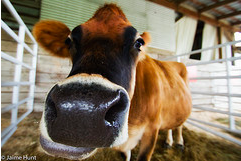Does It Matter If Your Steak Burrito Isn’t Locally Sourced If The Cow Was Raised Ethically?
For many discerning customers, a burrito is not just a burrito — it’s a thing of culinary beauty that tastes even better when the ingredients are organic, come from a farm nearby and were raised happily. But what if not all of those things can come together, what’s a business owner to do in a quest to please customers?
For the CEO of Boloco, a chain of more than 20 burrito restaurants in six states, he’s touting the fact that although his burritos are filled with ethically raised beef, non-GMO corn, organic tofu and family-run farms as suppliers. There’s just one tiny catch, notes NPR’s The Salt blog — that family farm happens to be thousands of miles way in Uruguay.
Boloco’s John Pepper is banking on the fact that even though his beef is sourced from far away, it’s a socially-conscious choice for his company.
“I even wondered: Are we doing the right thing?” he said of moving his meat to South America. “So I went down there to see.”
On those farms, the beef for Boloco’s flank steak is organic-grass fed and hormone-free. But how does that stack up against the carbon footprint of transporting it to the United States?
NPR asked Ben Lilliston, vice president of programs at the Institute for Agriculture and Trade Policy to weigh in.
“How the food is produced, in many ways, is more important than the distance that it goes,” he says.
It turns out that the environment is impacted more by how the cattle are raised on a farm, and not in how the beef is transported. On the one hand, grain feed has to be grown, harvested, processed and then shipped, which can mean a big carbon footprint. Grass-fed beef is arguably a more sustainable option, say proponents.
What do you think?
Not Local Food, And Not Afraid To Say It [The Salt]
Want more consumer news? Visit our parent organization, Consumer Reports, for the latest on scams, recalls, and other consumer issues.


